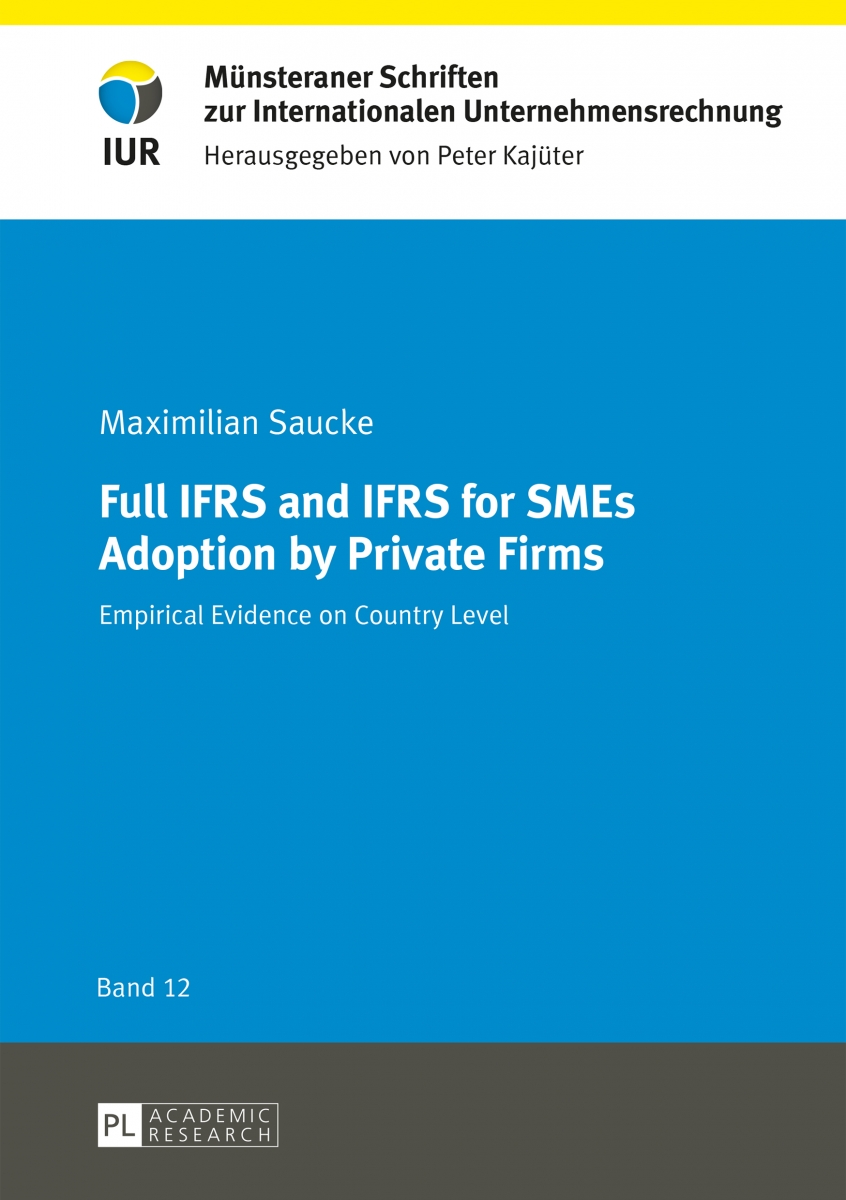Band 12
Maximilian Saucke – Full IFRS and IFRS for SMEs Adoption by Private Firms
Empirical Evidence on Country Level, Frankfurt a.M. et al. 2015.

Since the foundation of the IASB in 2001, International Financial Reporting Standards (IFRS) have been adopted by listed companies in more than 130 countries worldwide. During the same period of time, many countries have also expanded the scope of IFRS adoption to the field of private firms. Since the issuance of the IFRS for SMEs in July 2009, the situation has become a lot more complex. The worldwide process towards international accounting harmonization cannot be summarized by simply adding up the number of Full IFRS adopters anymore. Separate analyses are needed for the field of listed and private firms as well as for Full IFRS and IFRS for SMEs adoption. Besides, countries continue to modify IFRS for local purposes instead of adopting IFRS ‘as published by the IASB’. They often restrict the mandatory or voluntary use of these standards to the individual or consolidated financial statements of local entities with a certain size or legal form. For this reason, more attention has to be given to the ‘how’ of IFRS adoption.
While most countries from Africa, Central America and the Caribbean seem to adopt IASB standards without any modification, EU-IFRS clearly differ from IASB-IFRS regarding the accounting for macro hedges (IAS 39 carve-out) and due to postponed EU endorsement. Similarly, it is disputed whether Australia has adopted IFRS and in how far convergence has already been achieved between Full IFRS and US GAAP. The same is true for the adoption of local versions of the IFRS for SMEs within the European Union. Although the United Kingdom, Ireland, Sweden and Estonia have based their national accounting standards on the IFRS for SMEs, several differences remain. Hence, the frequent and inconsiderate use of the word ‘adopt’ may lead to a deceptive picture of the current state of international accounting harmonization.
Though being of high relevance for standard-setters and practitioners, the characteristics and determinants of worldwide Full IFRS and IFRS for SMEs adoption are largely unexplored in the field of private firms. This thesis reduces this research gap. The study analyzes the process of international accounting harmonization in the field of private firms in 110 countries between 2002 and 2014. It finds empirical evidence for the vanishing role of Local GAAPs, the continued existence of local versions of IFRS and the worldwide emergence of a ‘two standard system’. Due to GAAP complementation, countries tend to face more intra-national GAAP diversity after they have adopted IFRS. Moreover, the empirical results suggest that modifications to IFRS combined with ambiguous IFRS definitions represent a major challenge to financial statement users worldwide. The findings also show that parallel adoption of Full IFRS and IFRS for SMEs has led to an increasing differentiation of local financial reporting regulation for private firms, in particular on the basis of firm size.
By integrating two theoretic concepts (economic theory of networks and institutional theory of isomorphism) into one comprehensive conceptual framework, net economic benefits, network effects, and political pressures are identified as important determinants of Full IFRS and IFRS for SMEs adoption in the field of private firms by 2008 and by 2014. The study thereby provides an insight into the interdependencies between Full IFRS and IFRS for SMEs adoption on country level. It is expected that the IFRS for SMEs may become more diffused than Full IFRS in the field of private firms as it can bring considerable net economic benefits compared to the adoption of local standards or Full IFRS.
The empirical results of the study contribute to both accounting theory and practice by providing the IASB and national standard-setters with new insights into the characteristics and determinants of international accounting harmonization in the field of private firms.


